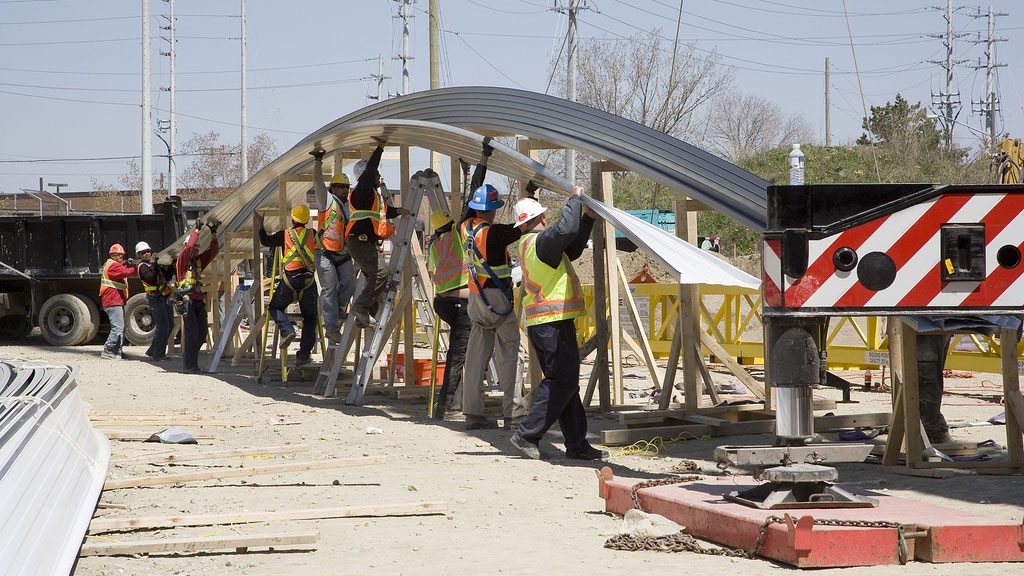The passing of Bill 66 by the Ontario government could put an end to construction labour monopolies, however, an amendment in the legislation provides certain public entities the choice to opt out of the new rules.
Bill 66, the Restoring Ontario’s Competitiveness Act, 2019, received royal assent April 3.
The most significant change for the construction industry will be amendments to the Labour Relations Act, 1995, which will deem public bodies as “non-construction employers.” This change allows these public entities to open bidding on construction contracts to all qualified companies, not just the unions they are affiliated with.
Public sector entities such as the cities of Toronto, Hamilton, Sault Ste. Marie and the Region of Waterloo, as well as school boards, hospitals, colleges and universities that were previously construction employers would now be open. However, the amendment allows councils or decision-makers to write to the Ministry of Labour within 90 days of royal assent to opt out and maintain the status quo.
“We’re certainly not happy about it,” said Mike Yorke, president and director of public affairs for the Carpenters’ District Council of Ontario. “We’re very concerned, but as we said before we’re going to do everything that we can to stop the implementation of this. Acknowledging that we were not successful at the provincial level, we now need to refocus our efforts at the municipal and public sector level. At the same time, we will do what we need to do to challenge this up to and including the Supreme Court.”
Yorke said the council has been holding a series of town halls and will continue to do so in order to educate and engage with members.
“We’re under a big threat to our collective agreements,” he said, “but it has been a refreshing engagement with our members who are really up for a challenge.”
The opt out clause puts everyone on a level playing field, countered Giovanni Cautillo, executive director of the Ontario Sewer and Watermain Construction Association (OSWCA).
“Opting out makes sense because it allows the municipalities to ensure that they get the best value for their dollar because it’s tax dollars that are spent on infrastructure,” he said. “The way the legislation is worded, you are automatically opted out. If you had been certified by a union, that ceases to be the case immediately.”
Yorke said the opt out clause is seen as passing the buck.
“It’s now in the bailiwick of the municipalities to make a decision on whether or not they want to maintain their collective agreements with a number of different construction unions,” he explained.
“We want them to engage with the ministry and say we’ve had positive working relationships, in some cases over generations. Why would we want to disrupt that?”
Supporters of the changes said it will bring a much greater degree of fairness.
“CLAC (the Christian Labourers Association of Canada) is excited that this will open up municipalities and other public entities to our members who have been cut out of work because they have been affected by the labour monopolies,” said Ian DeWaard.
The Ontario director for the association states CLAC will spend the next three months working with municipal councils to educate them on the value of fair and open tendering.
“We will be taking the same message that we’ve brought to the province over the last eight years that fair and open tendering is good for workers. It’s fair for contractors whose workers are qualified and experienced and have demonstrated success in major projects.”
It’s also good for the taxpayer, he noted.
“We’ve seen reports that support the fact that closed tendering creates a premium of eight to 25 per cent because of a reduced list of bidders,” DeWaard stated. “Taxpayers are paying a premium in those municipalities on construction — that is unnecessary. That doesn’t benefit workers and certainly doesn’t serve the taxpayer.”
The Progressive Contractors Association of Canada (PCA) said the bill is “another major milestone for fair and open construction in Ontario.”
“It will stop the threat of any further expansion of closed tendering across the province, so that’s an incredibly important milestone in and of itself,” explained Sean Reid, vice-president and regional director, Ontario with the PCA.
The association will also spend the next 90 days working closely with the affected municipalities to encourage them to remain open.
“It’s no secret that certain special interest groups are not happy about bringing back fair and open tendering. They will be, I’m sure, lobbying aggressively to pressure certain municipal leaders to roll back the clock and stay closed, remain a monopoly,” Reid noted. “We will be encouraging those municipalities to withstand those pressure tactics and instead embrace the fairness that Bill 66 brings.”
Yorke said if municipalities and public sector organizations were to rip up a collective agreement with any of the construction unions, it could open the door to the further growth of the underground economy.
“If you want to stop underground economic activity, you maintain a valid collective agreement with a construction union,” said Yorke. “The union has a certain amount of energy and human resources to make sure all appropriate taxes, benefits and pensions are paid for those workers.
“We are having a day of education and action Monday, April 15. We’re going to be speaking to community leaders, political leaders across North America.”
Cautillo disagreed with the speculation that the underground economy would grow, saying municipalities have the ability to ensure qualified companies bid on projects through a regimented procurement process.
“I don’t believe that just because they have allowed for open tendering on projects that everything is suddenly going to be the Wild West,” Cautillo stated, adding OSWCA represents both union and non-union contractors.
“I can tell you all of them are on par. You don’t necessarily need a union affiliation in order to provide service.
“Restricting participation based on labour affiliation shouldn’t be the emphasis of the municipality, it should be based on the best price point for the consumer, the taxpayers.”








Recent Comments
comments for this post are closed